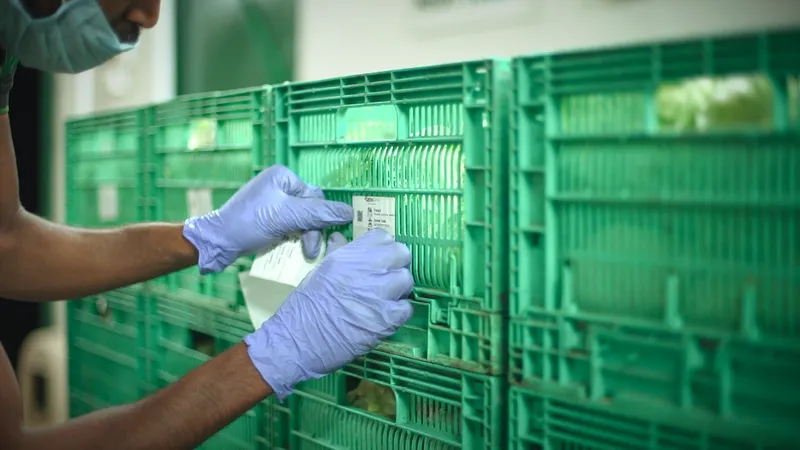
Social Alpha
View Brand PublisherHow traceability can heal our splintered food and Agri supply chains from farm to fork
The food we consume undertakes a long journey — from the farm, through the processor and retailer, all the way to the plate. Multiple players and intermediaries contribute to the Indian agri-food supply chain with farmers on one end and consumers on the other. Tracking the product at every step of the supply chain is called traceability — and it's more relevant today than ever.
The pandemic has sharpened our focus and awareness of food fraudulence, wastage, and the damage wreaked by climate change. However, the current state of the Indian food supply chain does not provide the answers, trust or transparency that today's customers require. Nor does it grant farmers any say or power in where their product is being sold or how much it is worth. Considering that India is the second-largest gross agricultural producer globally with almost 60 percent of the population engaged in agricultural activities as a means of livelihood, building a reliable and resilient agri-food supply chain is the way forward to improve farmers' livelihoods and food safety for end consumers. In order to do so, TraceX, a digital agriculture platform co-founded by Srivatsa Sreevivasrao and Anil Nadig, is creating innovative solutions to heal, bolster and build trust in India's food supply chains.
The case for traceability
Although traceability is not a new concept, the interest had been relatively low. Today, several key factors are driving the adoption of traceability systems. Firstly, consumers are now willing to pay a premium for food that is produced and distributed safely. Monitoring food quality, alleviating safety risks, reducing the possibility of fraudulence, and developing effective supply chains will add value to a food that is labelled with all the relevant information. Secondly, the government is increasing its efforts to promote the implementation of traceability systems across agricultural value chains to double farmers’ income and meet international standards for export. Moreover, the Government has sanctioned around 500 posts in the Food Safety and Standards Authority of India (FSSAI). The FSSAI handles domestic regulation of food as well as the regulation of imported food. With a bolstered staff strength, the regulator will now redouble its efforts towards food safety inspections and the enforcement of Central licenses (as opposed to the organisation’s current dependency on individual states). These moves signal growing confidence in the capabilities of the FSSAI to ramp up food safety training and certifications.
The challenges and complexities of the Indian food supply chain
With over 1.36 billion people to feed and a fractured food chain, the challenges of the Indian food supply chain are unique. Additionally, most of the transactions along the supply chain remain physical, which makes tracking and tracing difficult.
This process needs to be built from the field up, with the adoption of technology and digitisation as the first step. If various value chains can be digitised, it will be a significant move towards creating safe and high-quality food.
Benefits of transparent agri-food supply chains
Traceability involves keeping a watchful eye on the food at every step - from production to processing, storage, and distribution before reaching the retailer and finally to the end consumer. A process like this creates openness, transparency, and accountability. It also helps empower every stakeholder in the supply chain, including the farmers, aggregators, distributors, buyers, retailers, and consumers. Most importantly, transparent supply chains can also strike the right balance between the price a consumer is willing to pay and the farmer's share of profits.

Besides these overarching benefits of traceability, there are also direct benefits for the smallholder farmer and the customer.
Kishore Athota, Portfolio Manager at Social Alpha, shares, “The average smallholder farmer in India receives only a fraction of the final value sold at the marketplace. With the green revolution, farmers adopted intensive cultivation practices, and the consequences are resulting in a decade of stagnated yields, reduced availability of natural resources, increased soil degradation and health, decreased fertility of the soil and sub-standard produce quality.”
By integrating farming practices with the right technology, India's farming community, especially, the smallholder farmers, can learn to build more sustainable farming practices, adopt safe cultivation practices and introduce verifiability of produce claims. Furthermore, traceability can benefit the farming community through improved market access, better price realisation, and access to valuable farm management data.
Every customer or consumer has the democratic right to have access to safe and nutritious food. According to the WHO, unsafe food causes harmful bacteria, parasites, chemical substances, and other dangerous elements that cause over 200 diseases — from diarrhea to cancer. These foodborne diseases often have widespread effects, impacting socio-economic developments, trade and tourism, and global health, particularly children and infants.
Building India's traceability systems
As the focus turns towards food safety, change is required at every level of the agri-food supply chains. An integral part of that change will come by integrating various technologies to provide end-to-end digital solutions. Cisco India, which has invested and supported startups in creating solutions around traceability, believes that the Internet of Things (IoT) will be hugely beneficial in this field.
Harish Krishnan, Managing Director & Chief Policy Officer, Cisco Systems, India & SAARC, said, "IoT, which marries advanced software with sensors and other end-devices on a communications network, can help us transform supply chains that serve as the critical arteries of the agri sector."
Coupled with advanced data analytics, IoT can offer smart and real-time data that can improve farmers' productivity while reducing unnecessary costs.
Leading the charge in developing India's traceability ecosystem are startups like TraceX, which provides traceable supply chains for ethical, sustainable, and responsible businesses. TraceX harnesses the power of blockchain across livestock, poultry, seafood, and agri supply chains. Digitising the supply chain provides accountability and transparency for each link in the chain and for every stakeholder.
TraceX uses a network-based approach, which allows every participant on the supply chain to transact on the blockchain network independently. This ensures that there is one single, immutable and tamper-free source of data (due to the secure nature of blockchain), offering consumers and stakeholders a high level of credibility. The company's traceability system also accounts for technology users with different levels of expertise, which means every stakeholder, from a farmer to a CEO, can use it. Today, the company works with 22 businesses, 8,000+ farmers, and over 5,500 hectares of land across India. Through key partnerships, grants, mentoring and support from Cisco and Social Alpha, TraceX has created traceable supply chains for coffee, basmati rice, spices, Nendran bananas, and milk.
The startup has also partnered with Niti Aayog and the Department of Agriculture (both at the state and the Central level) to introduce a nationwide platform called Bharat Food Assure for agri and food traceability. They have also collaborated with several state governments to build credibility in supply chains, and have successfully completed the pilot for end-to-end traceability of milk and milk products for a dairy company in Odisha called Milk Mantra and has also implemented blockchain seed traceability for certain varieties of paddy.
Ajith Pai, Founder and CEO, Green Earth Fresh Produce, said, "TraceX has been critical in helping us chronicle the journey of our fresh produce grown in our contract farms in the Nilgiris all the way to our customers who consume them in the burgers and salads in some of the top QSR brands such as McDonalds, KFC and Burger King in the country. We are able to accomplish comprehensive traceability across our supply chain and effectively monitor the inputs and practices in our farms which helps us in ensuring adherence to good agricultural practices that are so important in the minds of our consumers."
While TraceX is now looking at creating simpler traceability solutions for different brands and companies in the agri-food space, it is also turning its gaze towards other geographies, given that international food companies depend on India for their raw materials. They have already worked with a state government to successfully track and trace the export of a GI crop from India to the supermarkets of the UK, giving them vital experience to take on other international projects.








